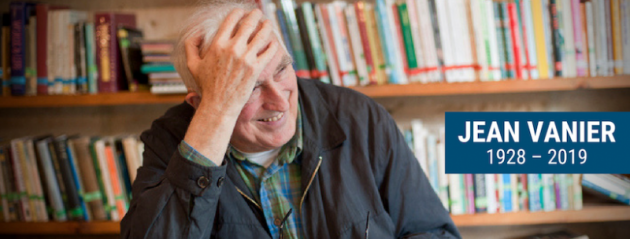Former naval officer Jean Vanier chose relationships with intellectually disabled, spurning privilege

The headline for a newspaper letter extolling a man who lived what he espoused, engaging with shunned people often unable to effectively communicate verbally, said, "Jean Vanier was a living saint."
Atop the letter to the Toronto Star, it was probably the neatest summary of the life of a former naval officer who was a fervent champion of the developmentally disabled, a proponent of peace and a humane society.
Vanier, who died of cancer in Paris age 90 on 7 May, was the founder of L'Arche, a federation of 154 communities for adults with learning disabilities in 38 countries, on five continents, who inspired those he worked for and those who worked with him.
His funeral will take place on May 16 in his community at Trosly-Breuil in northern France. This will be a private ceremony for his community, close friends and family and representatives of the Federation of L'Arche as well as of Faith and Light, L'Arche International, said.
"Our mission is to make known the gifts of people with intellectual disabilities, working together toward a more humane society," L'Arche says on its website.
Vanier said, "The most important thing is not to do things for people who are poor and in distress, but to enter into relationship with them, to be with them and help them find confidence in themselves and discover their own gifts."
With Marie Helene Mathieu, Vanier also co-founded Faith and Light, a network of communities of friendship, mutual sharing and support for people with intellectual disabilities and their entourage. Today there are 1,500 such communities in 82 countries.
He also said once: "I had no plan, I just met people and people with disabilities awoke my heart."
NPR ran a story on him titled, "Remembering Jean Vanier, The 'Living Saint'"
Jesuit priest Rev. James Martin said on the NPR program, "There is absolutely zero question in my mind that he is a saint. And I'm sure the church will, in decades or maybe centuries, recognize him as Saint Jean Vanier."
Vanier addressed the World Council of Churches assembly, its highest governing body, in Vancouver in 1983. And in 1997, he addressed a plenary session of the WCC Central Committee, its main governing body, in Geneva on worship and spirituality.
"Jean Vanier gave a moving presentation which emphasized the importance of commitment to Jesus Christ, spiritual disciplines and love for the needy, placing special emphasis on those with disabilities," the WCC recorded.
'PRECIOUS TO GOD'
Susan Peek wrote in the 15 April 1997 United Methodist News Service report, "The Central Committee participated in a foot-washing ceremony that...impacted the group 'in a very profound way'. It was led by Jean Vanier, founder of l'Arche."
Vanier said at that meeting, "Through touch, we are called to say, 'We love you; we appreciate you ... you are beautiful and precious to God.' "
Tributes for Vanier from around the world flowed after the death of the war-time British and Canadian naval officer who turned his back on his privileged background to dedicate his life to intellectually challenged people, often not able to speak up for themselves.
L'Arche wrote on its website, "Jean could potentially have risen high in the navy. But horrified by the Holocaust and the dropping of the atomic bombs on Japan, he felt increasingly drawn to prayer, and finally heeded an inner call to leave the navy and devote himself to peacemaking.
"He could also have had a successful academic career after attaining a doctorate on Aristotle. He was an inspiring philosophy teacher, but instead of going up the normal ladder of success, he realized that his call was elsewhere. He redefined what success is. For him, it was about relationship and not the 'tyranny of normality' as he later expressed it."
Vanier wrote 30 books on spirituality and community, including Community and Growth (1979), Becoming Human (1998), From Brokenness to Community (1992), Befriending the Stranger (2005) and Life's Great Questions (2015).
In Becoming Human, on reconciliation, he wrote, "In healthy belonging, we have respect for one another," he wrote. "We work together, cooperate in a healthy way, listen to each other. We learn how to resolve the conflicts that arise when one person seeks to dominate another.
"In a true state of belonging, those who have less conventional knowledge, who are seemingly powerless, who have different capacities, are respected and listened to. In such a place of belonging, if it is a good place, power is not imposed from on high, but all members seek to work together as a body. The implication is that we see each other as persons and not just as cogs in a machine. We open up and interact with each other so that all can participate in the making of decisions."
TEMPLETON PRIZE
In 2015 he was awarded the Templeton Prize, for making "an exceptional contribution to affirming life's spiritual dimension". The prize is one of the world's biggest annual awards for an individual.
Vanier was born in Geneva, the fourth of five children of Georges Vanier, a Canadian soldier and diplomat, and his wife, Pauline (who was born Archer), who were both committed Roman Catholics.
His father served in World War I, became Canada's ambassador to France and later governor general of Canada. Jean was not the only member of his family engaged in the care of others.
The Washington Post wrote, "Although driven by his Catholic faith, Vanier gradually led the L'Arche network into more ecumenical work. Observers described his theology as one of simple, concrete, tender acts: bathing a fellow human being, dining together, offering a reassuring touch."
The BBC's Martin Bashir wrote, "Vanier devoted his life to what has been described as the upside-down economics of Christianity: that the first shall be last. He embodied a principle first outlined in the New Testament by the Apostle Paul, who said, 'When I am weak, then am I strong.'"